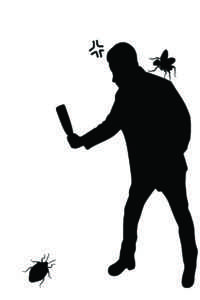
Chances are, in the past few weeks you’ve had a really unpleasant experience with some tiny flying black insects: they show up out of nowhere, and any illusions of harmlessness are dispelled when they chomp down on your skin and leave a red welt. There were many misconceptions floating around campus, that they were sandflies, no-see-um’s or a new kind of mosquito and that bug spray is the best way to keep their painful bites away. The S&B conducted an investigation into what type of bugs these are, why they seem to be so prevalent this year and what can be done to try and avoid their painful bites.
As it turns out, these bugs are insidious flower bugs, Orius insidiosus. A cousin of the minute pirate bug, the insidious flower bug is a carnivore that feeds on small insects and the eggs of other insects, which means they are an important form of pest control that helps protect the corn crop.
But what about their bite? According to Laura C. Jesse, an entomologist and specialist in integrated pest management at Iowa State University, the insidious flower bug’s bite may be painful, but is not harmful in the way that a bee sting or mosquito bite may be.
“Their bite is surprisingly painful for such a small insect as they probe their short blunt beak into the skin,” Jesse wrote in an article for “Horticulture and Home Pest News” describing the bug’s habits. “Their name describes their small size and their habits … [and they] make their presence known in a very convincing manner by biting with an impact that is out of proportion with their size.”
While insidious flower bugs seem like they’re small enough to crawl through any opening, Jesse advised that the best way to avoid their bite was not to rely on bug spray, but to wear dark-colored shirts that the bugs may be somewhat averse to. If students get bit, help can always be found at SHACS, in the form of different over-the-counter medicines.
“[If] students are dealing with skin related issues related to these bugs, they can seek out support from SHACS in [the] way of free over-the-counter (sic) meds such as creams and anti-itch ointments,” wrote Director of SHACS operations Deb Shill in an email to the S&B.
If prevention of the insidious flower bugs’ bites hasn’t been going too well for you, fear not: the bugs will be gone as soon as the warm weather disappears. And don’t forget that there is an upside — they play a vital role in the environment, helping farmers with their crops. But what if you’re just looking for a little payback?
“One consolation — the bugs are not quick to fly following biting, so the victim usually has the satisfaction of removing the offender from the ranks of the living,” Jesse wrote.




























































